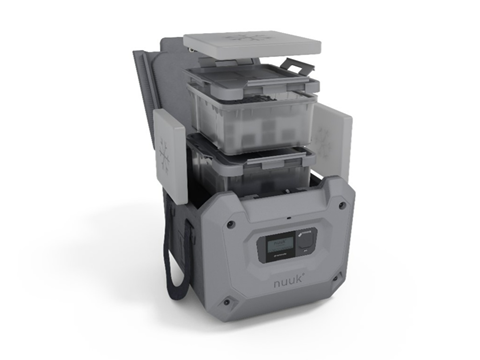
Groenlandia Tech and Inokor in Spain have partnered to create a temperature-controlled cooler, Nuük, designed to transport products or samples in the hospital and pharmaceutical sectors with real-time sample tracking and total access control.
The container is made from ARPRO EPP as it apparently offers thermal insulation and energy absorption properties. The Nuük smart cooler uses both ARPRO Grey and ARPRO 5133 RE with a reported 30% recycled content from post-consumer EPP waste. Groenlandia says ARPRO with 30% recycled content generates 16% less CO2 in the production process compared to ARPRO made from virgin material.
Access control is provided via a RFID locking system, and only the initial user and the final recipient can access the contents in the cooler.
The control and traceability of biological samples is a common problem in the hospital and pharmaceutical sectors. Groenlandia says around 50% of biological samples with incidents are due to failures in the logistics chain, globally equating to 1.5 billion samples per year.
With the Nuük cooler, an alert system is activated if the temperature is out of range, the cooler is opened, or if an impact is sustained.
Inokor’s team in Spain created a 3D model and tested the prototype against the quality and sustainability requirements.
The product was intended to align with Groenlandia’s commitment to minimize environmental impact and reassure customers of the durability of the container, meaning multiple uses and a lifespan of at least five years. It also needed to be ultra-light so once fully loaded, it would not exceed safe lifting weights with the technology integrated into the box.
The Hospital Central de La Defensa Gómez Ulla in Madrid, Spain is currently using the Nuük cooler and pilot tests are being carried out at the Hospital de Bellvitge, Vall d’Hebrón in Barcelona, Hospital de Elche and others.
The Nuük cooler has been designed and certified according to the UN-3373 regulation for transport of biological substances Category B.
Recently, Hydropac announced its new ice pack sealing technology that seeks to enhance the cold chain logistics of pet food by improving insulation, increasing leak resistance, and keeping temperature-sensitive products cooler for longer. The technology seals all four sides of the ice pack with two layers of material, which the company claims maximizes insulation and prevents temperature fluctuations during transportation.
Earlier in the year, Westpak launched its HeatWave packaging in an effort to improve the heat retention of delivery and takeaway pizzas by over 20%. The packaging has been designed as a liner sheet that fits into existing standardised cardboard pizza boxes, with alternating concave and convex domes that lift the pizza base away from the bottom of the box.
If you liked this story, you might also enjoy:
How are the top brands progressing on packaging sustainability?
The ultimate guide to global plastic sustainability regulation














No comments yet